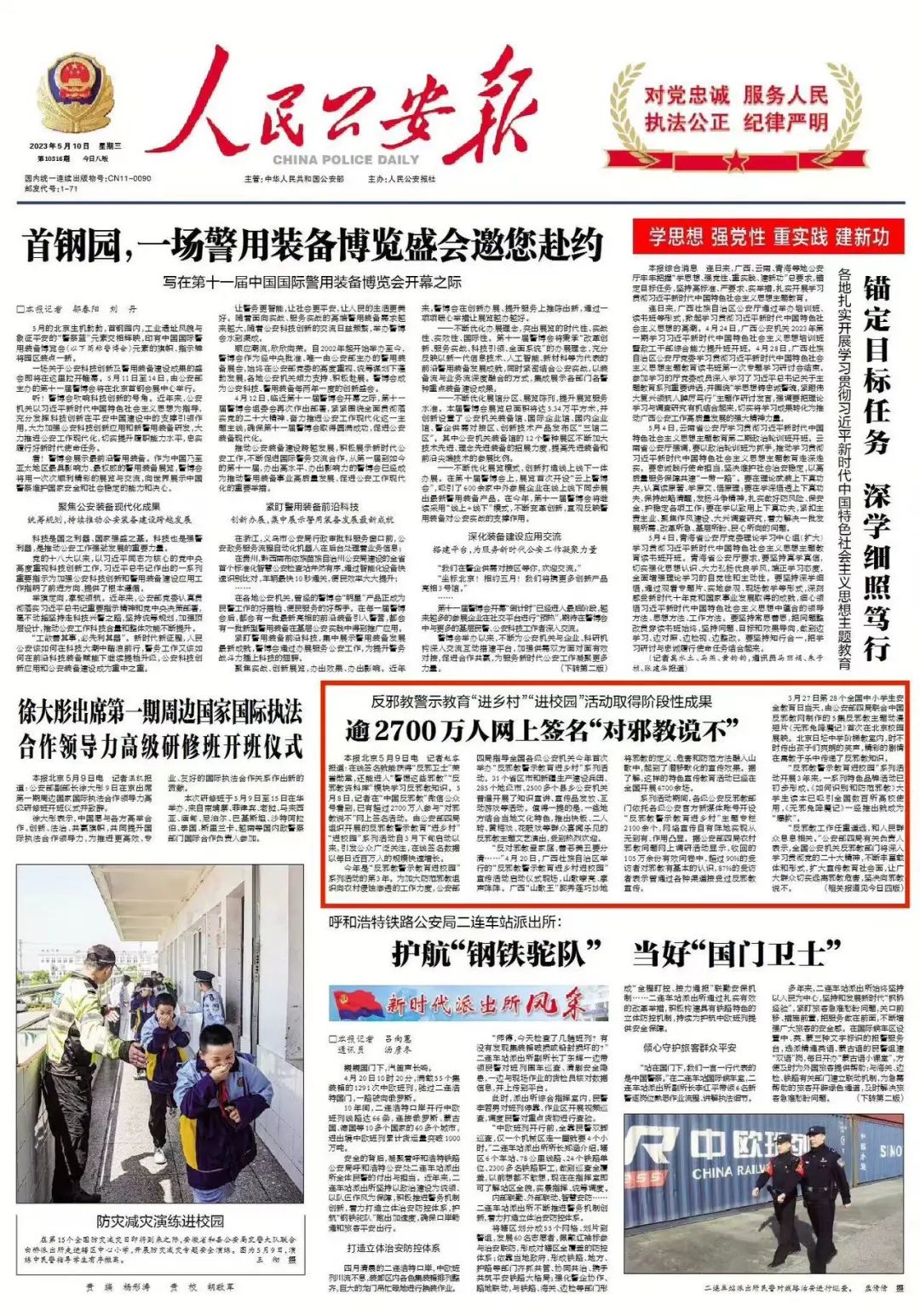CCP Launches Nationwide Anti-Falun Gong Petition Campaign, Deceiving Tens of Millions
Police pressure citizens to sign and regime deploys WeChat app to drive the campaign

Fukang County police in Xinjiang soliciting signatures for the anti-Falun Gong petition. Tens of millions have been deceived by the campaign, aimed at indoctrinating Chinese students and rural citizens. Photograph: People's Daily
The Chinese Communist Party (CCP) is mobilizing institutions throughout Chinese society and the ubiquitous WeChat app to spread false propaganda demonizing Falun Gong and garner millions of signatures on a petition against the faith and other banned religious groups, according to new research by the Falun Dafa Information Center.
The petition campaign, launched in early 2023, is centered on an interactive petition with animated characters that was published on Tencent’s WeChat app by the China Anti-Cult Association (CACA), an organization operating under the CCP’s Political and Legal Affairs Committee that has long been at the forefront of the regime’s efforts to demonize and persecute Falun Gong.
“For many years across China, millions of Falun Gong practitioners have printed and distributed homemade leaflets exposing the persecution they face and the tyrannical nature of the CCP more broadly, debunking state propaganda,” says Falun Dafa Information Center executive director, Levi Browde. “This new WeChat campaign is clearly a desperate attempt to combat this grassroots truth-telling and force people to toe the CCP line.”
“We know from public speeches in recent years that the CCP’s crusade to ‘severely crackdown’ on Falun Gong remains a top priority for the security apparatus, and this campaign is clearly an Orwellian attempt to do just that,” adds Browde.
This recent effort marks the largest signature drive to slander the spiritual practice Falun Gong implemented by the CCP since 2017, when the Supreme People’s Procuratorate endorsed a signature campaign by the CACA and the 610 Office. Tens of millions have signed the petition, according to multiple sources. Research by the Center identified references to the campaign on Chinese government or other official websites in 30 provinces, municipalities, and autonomous regions.
Chinese state media reports about the campaign similarly highlight its nationwide scope. “Public security organs in 31 provinces, autonomous regions and municipalities, the Xinjiang Production and Construction Corps, 285 prefecture-level cities, and more than 2,500 counties and townships” have implemented promotions for this petition, according to a May 10, 2023 report in the People’s Daily newspaper, a CCP mouthpiece. As stated in the article, publicity in some regions has also extended into “interactive games… and theatrical performances.”
The campaign is ongoing. As recently as January 8, 2024, Chinese government websites were reporting activities related to the petition.
Co-opting technology
At the center of the campaign is the WeChat app, a messaging and e-commerce application developed by Chinese tech giant Tencent that is integral to daily life in China. WeChat has over one billion users, but also a history of aiding CCP surveillance and censorship of political dissidents, ethnic minorities, and persecuted religious communities. The anti-Falun Gong petition features cartoon characters such as a miniature warrior, a cute bunny, and WeChat badges aimed to appeal to users of all ages. It is activated through a QR code, which directs users to the profile page of the China Anti-Cult Association.

(Pictured: The cartoon landing page of the petition encourages users to tap a big circle button in the middle, labeled “Click to sign.” Four other four buttons below the circle read: “Be wary of these cults”, “Anti-cult database”, “Questionnaire”, “Ranking list of signatures by region.”)
According to screenshots published online by multiple government websites, the five-step petition requires WeChat users to read through photos and stories demonizing twenty-five banned spiritual groups and religions, with a significant emphasis on Falun Gong.
Images and language include long disproven fabrications about Falun Gong practitioners committing murder or self-immolating, a reference to an incident staged by the CCP in January 2001 and used to turn public opinion against the practice and justify increased violence against its believers.
Recommended actions for those who sign the petition include: rejecting flyers and CDs shared by believers, informing police about money with Falun Gong messages, and reporting to authorities on friends and family who practice Falun Gong.
After confirming their signature with a tap, users are then asked to input their location details and full name.

(Pictured: Falun Gong is listed as the first of the 25 banned spiritual groups, according to a graphic created by the CCP petition campaign on WeChat.)
Lastly, users receive an award of completion, named the “Guardian Badge”, and are encouraged to share the petition with their friends and family.

(Pictured: The Guardian badge received upon completion, captioned “Congratulations on receiving the “Anti-Cult Guardian Medal of Honor”!)
It remains unclear what consequences users face if they refuse to sign the petition, such as restrictions on their WeChat accounts’ functionality or reporting of their names to authorities. However, according to Browde, the ramifications are obvious to Chinese users.
“Everyone will know that their refusal to sign the petition will be noted by authorities, and kept on their digital record,” says Browde. “Given pervasive surveillance across China, this is an insidious way to classify all citizens as for or against Falun Gong, which can be used against them at any time in the future.”
Massive scale, mobilizing society
The regime’s effort to collect signatures on the petition—titled by the CCP, “Say No to Heretics” (“对邪教说不” 签名活动)—is nationwide and has also involved offline activities. Various state and party institutions have been recruited into its implementation, including the police force, Public Security Bureaus, neighborhood and municipal CCP committees, village committees, and school administrations.
According to references on local government websites, members of CCP neighborhood committees have set up booths at major supermarkets, public squares, and parks to solicit signatures in places like Jinzhou City of Liaoning province and Tianhe District of Guangdong province.
In Jiangsu province, Party members in Erjia Town partnered with village clinic staff to solicit door-to-door petition signatures by providing free blood pressure measurements. The Erjia Town Party committee members claimed “good health” included staying away from banned religions, including presumably Falun Gong.
In 2023 and 2024, the Chinese regime has expanded the signature campaign program to cover rural villages and ethnic minority regions. Three examples include:
- Village committees in Sichuan province reportedly organized over 70 anti-Falun Gong events, hung 32 banners, and distributed more than 3,000 posters across their communities to promote the petition.
- The Haidong Public Security Bureau in Qinghai province held over 20 publicity events about the petition, hung over 50 banners, posted over 3,000 posters, distributed over 5,000 brochures and 4,000 other promotional materials.
- The Jingyuan County Public Security Bureau in Ningxia Autonomous Region held 3 publicity activities in rural areas and religious sites, placed 6 propaganda display boards, distributed over 2,000 publicity materials, posted over 100 posters, and reached more than 2,000 people in the region.
Some of the most robust documentation of the campaign appears in Tianjin, where the extra-legal police task force ‘610 Office’ is headquartered, responsible for carrying out the mission of eliminating Falun Gong both within China and via transnational repression abroad.
The local Public Security Bureau website published a total of 41 articles to promote the petition between April 2023 and December 2023. Beginning on April 14, the Tianjin Municipal Public Security Bureau jointly launched an event with multiple Dongli District Committee departments, including the National Security Office and the Political and Legal Affairs Committee, to announce the petition campaign. Held in the main lobby of a three-story mall, the event consisted of 12 booths that reportedly distributed over 5,000 promotional materials in one day. The event also featured a theatrical and aerobics performance in the theme of “Say No to Heretics”.
(Pictured: The April 14 event organized by the Tianjin Municipal Public Security Bureau featured theatrical performances. A similar event promoting the campaign was held by local officials in Wuhe’s Xinji Town, Anhui province using the form of Peking opera.)
But it is not only through propaganda tactics and questionable artistic productions that the campaign is being implemented.
Multiple photos found on Chinese government websites show police officers or CCP committee representatives hovering over mobile phone users as they sign the petition. In such intimidating circumstances, it becomes almost impossible for a user to refuse to sign, regardless of their actual opinion about Falun Gong and religious freedom.
“This campaign is the latest reminder that the victims of the CCP’s persecution are not only Falun Gong practitioners,” says Browde. “The tactics involved are creating a coercive and intimidating environment targeting all Chinese citizens. They are being forced to sign a document that they may thoroughly disagree with and goes against their conscience because a policeman is looking over their shoulder, because they fear retribution at school, because they could get locked out of their WeChat account, or simply be put on a list as someone who is sympathetic to Falun Gong, a reality that could draw other reprisals.”
(Pictured: Public Security Bureau’s website in Fangcheng County shows officers from a Special Patrol Brigade standing before mobile phone users and awaiting their signature on the petition in gaming cafes, grocery stores, train stations, shoe stores, food stalls, and on the streets. The images were posted by the local government to report on local enforcement measures in response to the nationwide “Say No to Heretics” campaign.)
This tactic fits with reports of other recent campaigns by Chinese police to force mobile phone users to install an “anti-fraud” app created by the Ministry of Public Security, which many activists believe is in fact used to monitor users or prevent incoming international calls.
Millions of signatures collected
This large-scale effort using a variety of technical and coercive measures has enabled the CCP to garner large numbers of signatures on the petition. In one item from May 2023, the Tianjin Municipal Public Security Bureau claimed that 27 million signatures had been collected nationwide. The Tianjin report further claimed the campaign had reached a rate of “one million signatures per day.” State-run media such as People’s Daily and Sohu News widely spread the same figure, although the number of signatures has certainly increased by now.
(Pictured: May 10, 2023 edition of the People’s Daily newspaper running the ’27 million’ petition signatures story on its front page. On the second page, the state-run media inserted a photo of the Fukang Public Security Bureau in Xinjiang soliciting signatures on the street.)
One screenshot of a WeChat account found on the website run by a rural village police station appears to indicate 46.9 million people had signed the petition by the fall of 2023. This scale matches reports from the Minghui website, an overseas Falun Gong website that publishes first-hand accounts from citizen journalists across China, which also reported tens of millions of signatures amassed as of October 2023.
Infiltrating education, rallying Chinese youth

(Pictured: On May 23, 2023, students in Linye Primary School in Heilongjiang province listened to a lecture demonizing Falun Gong and banned religious groups. More than 150 students and teachers signed the propaganda banners, and more than 400 people signed the petition online.)
As evident from both the social media campaign and reports of offline activities, the regime appears to be placing a particular focus on influencing Chinese students in primary and secondary schools across China, trying to turn them against Falun Gong.
Thousands of schools, from primary schools to universities, are estimated to have implemented this signature campaign after China’s Ministry of Public Security and Ministry of Education jointly launched the “Anti-Heretics Warning Education on Campus” campaign in April 2023. For example, in Shandong province, 174 primary and secondary schools in Laiyang City with over 80,000 teachers and students were reportedly forced to watch propaganda films and sign the petition against Falun Gong.
Meanwhile, in Tangshan city of Hebei province, a party group suggested a five-point strategy to promote the petition locally. In order of priority, it listed the targeted areas as being the political and legal system, campuses, enterprises, the countryside, and online distribution through influencers. Schools were the second priority for public security officials to target.

(Pictured: On April 14, 2023, a group of elementary school students stopped to look at propaganda posters promoting the campaign at Zhangguzhuang Primary School in Zhangguzhuang Town, Xinji City, Hebei province.)
Such widespread efforts by the regime have personally impacted practitioners. In one case, a practitioner had clicked and signed the petition without realizing it defamed his faith. “The school organized a signature campaign to slander Falun Gong,” said the college student in China who practices Falun Gong in an article on the Minghui website. “I didn’t read the webpage closely and just clicked to sign it. Afterwards, I learned from my mother-in-law that the petition was slandering Falun Gong, and I deeply regretted it.”
The revival of the anti-Falun Gong signature drive coincides with a general intensification of the persecution efforts targeting students in recent years. In March 2023, the Falun Dafa Information Center reported on a signature drive in Wenzhou, southeastern China, that was aimed at kindergarten-age children and their parents.
This renewed focus on youth may reflect the CCP’s priority of indoctrinating students.
“The persecution of Falun Gong was launched nearly 25 years ago, long before many current students were born,” says Browde. “The signature drive introduces this new generation to demonizing and false propaganda about Falun Gong, inciting hatred against practitioners among this critical segment of the Chinese population. The campaign also renders them more likely to be fearful of Falun Gong believers, to report them to authorities, and to avoid taking up the practice at a time when many young people have shown renewed interest in spirituality.”
Why does it matter?
The signature drive is the latest example of the regime investing massive resources into its effort to marginalize and persecute Falun Gong practitioners. It matches other findings by the Falun Dafa Information Center revealing that Falun Gong has emerged as an even higher priority for the CCP’s political security efforts than previously, according to comments by top officials and local governments since 2020.
Moreover, the tactics used by the CCP and the specific recommendations for petition signatories to reject materials distributed by religious believers demonstrates how security forces are trying to keep up with Falun Gong practitioners’ own nationwide, grassroots campaign to counter the regime’s demonizing propaganda, debunk falsehoods, and expose rights abuses.
Many of the materials distributed by Falun Gong practitioners do not only relate to the practice, but also to the CCP’s broader history of brutally persecuting tens of millions of Chinese people. Movements started by practitioners such as “Tuidang”, translated into “Quit the CCP”, have reputedly inspired hundreds of millions of Chinese citizens to publicly distance themselves from the CCP and its youth organizations, albeit sometimes using aliases for safety.
Indeed, the content and parameters of the regime’s latest petition campaign indirectly appear to acknowledge the potency and effectiveness of Falun Gong practitioners’ public education efforts.























